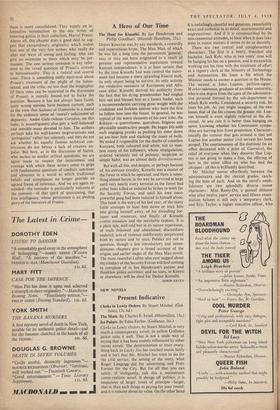A Hero of Our Time
The Hunt for Kimathi. By Ian Henderson and
Philip Goodhart. (Hamish Hamilton, 21s.) DEDAN KIMATHI was,by any standards, a cowardly and superstitious brute. The Mau Mau, of which he was for a long time the paramount 'general,' may or may not have originated as a result of genuine and representative aspirations toward Kenyan independence; it is at least certain that by the time Kimathi had won control the move- ment had become a mere sprawling Fascist mob, its only object being to survive, its only activity the vindictive massacre of Europeans and Afri- cans alike. Kimathi derived his authority from the fact that his dying grandmother had singled him out and blessed him as a future leader, such a recommendation carrying great weight with the credulous and feckless natives who were the first to follow him into the forest. In general, he was typical of the worst elements of his own tribe, the Kikuyu—a quarrelsome, querulous, litigious and physically unattractive people. He began life with such engaging pranks as pushing his sister down an ant-bear hole and slashing the noses of bulls. He ended it responsible for the deaths of countless Kenyans, both coloured and white, not to men- tion many of his followers, whose strangulation, ordered variously out of jealousy, suspicion or simple habit, was an almost daily divertissement.
But with all this, and despite, or perhaps because of, his extreme timidity, Kimathi was a master of the forest in which he operated; and there is some- thing almost heroic in the way he survived at large until very nearly every terrorist in, the forest had either been killed or induced by bribes to work for the Security Forces, and until his own once- powerful gang had been reduced to himself alone. This book is the story of his last year, of the many futile attempts to hunt him down or trick him into giving himself away, of his dwindling for- tunes and resources, and finally of Kimathi contra mundum and the inevitable capture. It is a plain tale, well told but in its nature repetitious, of trails followed and abandoned, discomforts endured, acts of violence indifferently perpetrated both by nature and by man. Politics are not in question, though a few introductory and unten- dentious chapters give a broad account of the origins and earlier stages of the Mau Mau revolt. The most resentful Leftist who ever nagged about the conduct of the Security Forces will find nothing to complain of in Ian Henderson's patient and thankless police activities; and no tears, in Kenya or elsewhere, will be shed for Dedan Kimathi.
stMON RAVEN






















































 Previous page
Previous page